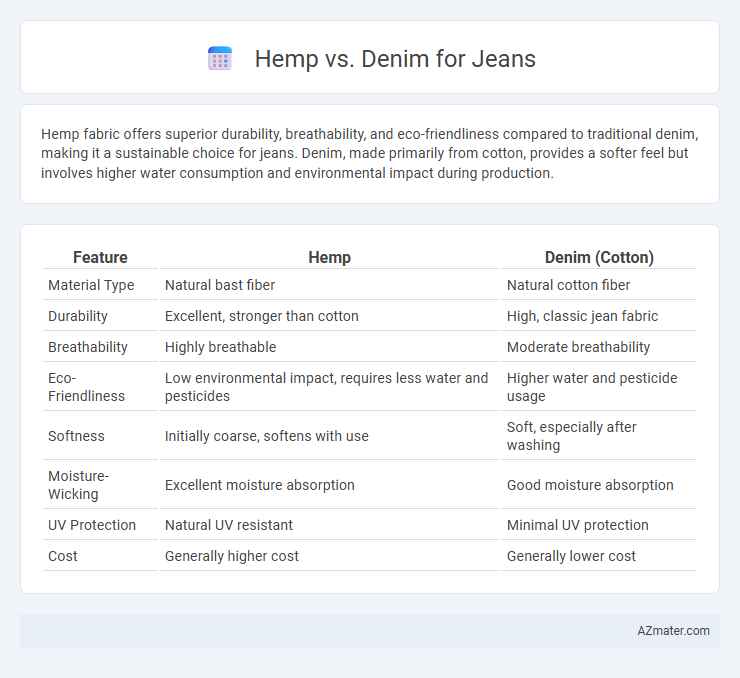Hemp fabric offers superior durability, breathability, and eco-friendliness compared to traditional denim, making it a sustainable choice for jeans. Denim, made primarily from cotton, provides a softer feel but involves higher water consumption and environmental impact during production.
Table of Comparison
| Feature | Hemp | Denim (Cotton) |
|---|---|---|
| Material Type | Natural bast fiber | Natural cotton fiber |
| Durability | Excellent, stronger than cotton | High, classic jean fabric |
| Breathability | Highly breathable | Moderate breathability |
| Eco-Friendliness | Low environmental impact, requires less water and pesticides | Higher water and pesticide usage |
| Softness | Initially coarse, softens with use | Soft, especially after washing |
| Moisture-Wicking | Excellent moisture absorption | Good moisture absorption |
| UV Protection | Natural UV resistant | Minimal UV protection |
| Cost | Generally higher cost | Generally lower cost |
Introduction: Hemp vs Denim Jeans
Hemp jeans offer superior durability and sustainability compared to traditional denim, using fibers from the Cannabis sativa plant that require less water and pesticides. Denim, typically made from cotton, provides a familiar texture and softness but involves higher environmental costs due to intensive farming practices. Choosing hemp over denim supports eco-friendly fashion by reducing carbon footprints while maintaining strength and comfort in jean production.
Historical Origins of Hemp and Denim
Hemp fibers have been used for thousands of years, with evidence dating back to ancient China around 2800 BCE, valued for their durability and breathability in textiles. Denim originated in the 19th century, specifically in the mid-1800s, as a sturdy cotton fabric woven in a twill pattern, famously associated with working-class garments during the California Gold Rush. Both materials reflect distinct cultural and industrial histories, with hemp rooted in traditional, sustainable agriculture and denim linked to mass production and American workwear heritage.
Material Composition and Fabric Differences
Hemp jeans are made from fibers of the Cannabis sativa plant, offering a durable, breathable, and eco-friendly fabric with natural antimicrobial properties. Denim is typically woven from cotton, known for its softness, flexibility, and classic rugged texture, but it lacks the sustainability attributes of hemp. Hemp fibers are stronger and more resistant to wear and tear, making hemp denim blends increasingly popular for enhanced durability and reduced environmental impact.
Sustainability and Environmental Impact
Hemp fabric for jeans offers superior sustainability due to its rapid growth and low water requirements compared to cotton used in denim, reducing resource depletion significantly. Hemp cultivation enhances soil health through natural pest resistance and requires fewer pesticides, minimizing environmental contamination. Denim production typically involves high water usage and chemical-intensive dyeing processes, contributing to larger ecological footprints than hemp alternatives.
Durability and Longevity Comparison
Hemp fibers are renowned for their superior durability compared to conventional denim cotton, offering increased resistance to abrasion and wear over time. Hemp jeans tend to maintain their structural integrity and color retention longer, resulting in extended garment longevity and reduced frequency of replacement. Denim, while durable, generally shows signs of fiber breakdown and fading faster than hemp, making hemp a more sustainable choice for long-lasting jeans.
Comfort and Wearability Factors
Hemp fibers in jeans offer superior breathability and moisture-wicking properties compared to traditional denim, ensuring enhanced comfort during extended wear. The natural strength of hemp provides durability without compromising softness, resulting in jeans that become more comfortable over time. Denim, typically made from cotton, maintains a familiar feel but tends to retain heat and moisture more, potentially affecting overall wearability in warmer climates.
Style, Texture, and Aesthetic Appeal
Hemp jeans exhibit a natural, slightly coarse texture that softens with wear, offering a rugged yet eco-friendly alternative to traditional denim's smooth, tightly woven cotton fabric. The style of hemp jeans leans toward a casual, earthy aesthetic that pairs well with sustainable fashion trends, while denim maintains a classic, versatile look favored for both casual and formal wear. In terms of aesthetic appeal, hemp provides a matte finish with subtle variations in tone, enhancing its organic charm compared to the uniform, often glossy surface of conventional denim.
Cost and Market Availability
Hemp jeans typically cost more than denim due to sustainable farming practices and eco-friendly production processes, which are less widespread and more resource-intensive. Denim remains more affordable and dominant in the market, benefiting from mass production and well-established supply chains across global textile industries. Availability of hemp jeans is limited but growing, driven by increasing consumer demand for sustainable fashion alternatives.
Consumer Trends and Popularity
Hemp jeans are gaining traction among eco-conscious consumers due to their sustainable cultivation and durability, appealing to a growing market seeking environmentally friendly fashion. Denim maintains its popularity for classic style and versatility, supported by decades of cultural association and continuous innovation in fabric blends. Market analysis reveals a rising preference for hemp blends in jeans, driven by increased awareness of textile environmental impact and consumer demand for organic materials.
The Future of Jeans: Hemp or Denim?
Hemp fabric offers exceptional durability, breathability, and eco-friendly benefits compared to traditional denim made from cotton. As sustainability becomes a major priority, hemp jeans reduce water consumption by up to 90% and require fewer pesticides, positioning them as a promising alternative for future denim production. Innovations in hemp processing and blending with organic cotton enhance comfort and softness, making hemp-based jeans increasingly appealing to environmentally conscious consumers.

Infographic: Hemp vs Denim for Jean
 azmater.com
azmater.com